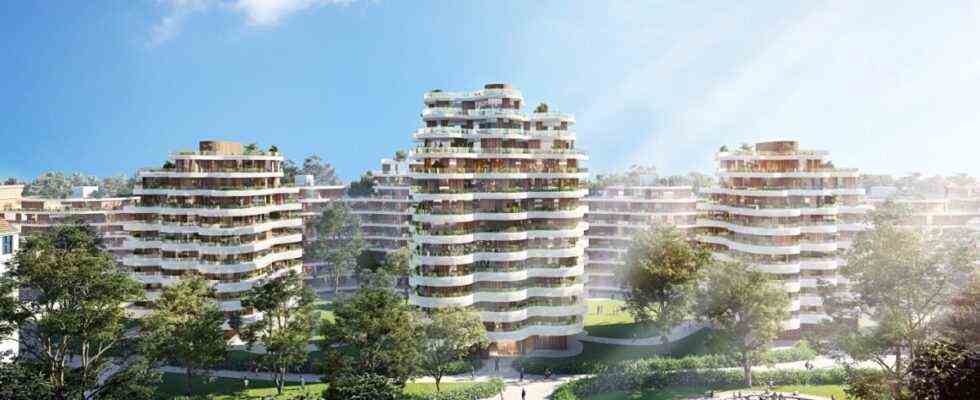Munich is to get three new residential areas with a total of around 4000 apartments. This was announced by the planning department on Wednesday at a meeting of the city council’s “Sobon Commission”, which does not meet in public. According to the preliminary plans, the largest area with around 1700 apartments is on Rappenweg in Trudering, right on the city limits of Haar. The second largest with around 1500 apartments is located a little further into town on Heltauer Straße / Birthälmer Straße, north of the Trudering S and U-Bahn (city rail) station. The third largest with around 800 apartments is planned on Dreilingsweg in Obermenzing.
The three projects were the subject of the Sobon Commission because there should be an exception for them from the significantly stricter social requirements for private housing projects. They are regarded as “transitional cases”, the investors, including Bayerische Hausbau and the Büschl Group, two of the largest players on the Munich real estate market, are only supposed to have to comply with a somewhat stricter version of the previously applicable Sobon rules.
“Politically, we would actually have said that we would not let anyone through who did not yet have a resolution for their project,” says Anna Hanusch, leader of the Green / Pink List parliamentary group. In these three cases, however, so many “basic approvals” had already been given in preliminary talks between investors and the planning department, explains Christian Müller, parliamentary group leader of SPD / Volt, that the new Sobon rules cannot be applied for reasons of protection of legitimate expectations. The coalition rejects the suspicion suggested by the opposition that Green-Red, with the exceptions, secured the approval of Hausbau and Büschl for the new Sobon. “There was no horse trading whatsoever,” says Müller. Hanusch emphasizes that in the exceptional cases it was only a question of the state of the proceedings, the names of the investors did not play a role.
With the Sobon, the city determines the extent to which builders have to surrender some of the planning profit that they receive from the additional building rights granted by the city. This runs, for example, through the obligation to create subsidized and price-reduced living space. So far it has been 40 percent of the total project where the rental prices were fixed for 25 years. The investor was able to sell the remaining 60 percent as condominiums. The new Sobon is more flexible, but overall it is much stricter. In the basic model, 60 percent of the living space must be price-linked, over 40 years. In addition, only 20 percent of condominiums are allowed to be built, with the rest being prohibited from splitting.
The new Sobon should apply to all projects for which the city council will start planning in the future with a so-called installation resolution. The three “transitional cases”, which in total are likely to make up a substantial proportion of private residential construction in this decade, still have to come before this point. For them, 50 percent of the price-regulated rental apartments are built that are tied for 40 years. Green city councilor Hanusch assured that the planning department had checked intensively that only these three projects were really so advanced that other investors could not derive any claims from the exceptions.
Much is not yet known about the three construction projects. Bayerische Hausbau explains that it owns around a third of the space in the largest project on Rappenweg, some of it belongs to the Büschl Group, and the city also has shares. Half of the houses on Dreilingsweg are owned and the other half belongs to the city. Hausbau does not provide any information on the number of apartments, they do not want to “give water level reports to the outside world” before informing the public. The city also holds part of the space on Heltauer Strasse, the rest belongs to various private individuals. The planning department also does not provide any information on the number of apartments, they only have “estimates” for internal purposes. The number of apartments can still change in the approval process for all projects.
On Thursday there were reactions from the real estate industry to the new Sobon, which is due to come into force at the end of July. Five Munich apartment builders – Bayerische Hausbau, Büschl Group, Baywobau, Isaria and Opes Immobilien – sent a statement. In it they describe the “modular model” on which the new Sobon is based, which enables various ways to meet the city’s specifications, as “in principle a good and suitable approach to allow more flexibility for property developers and property owners”. The design will, however, “not lead to more (affordable) living space”. They argue that “the economic incentive for us entrepreneurs to take on the multi-year venture of project development” has been “significantly reduced”. In other words: because the margins are falling, less is being built. In addition, the “considerable additional costs of the new Sobon” would drive up the prices of privately financed apartments even more.
Patrick Slapal, managing director of the Federal Association of Independent Real Estate and Housing Companies (BFW) in Bavaria, explained: “We have to check whether our company is not being deprived of its business basis.” That could lead to investors withdrawing or to sue the new Sobon, “both are possible”.

